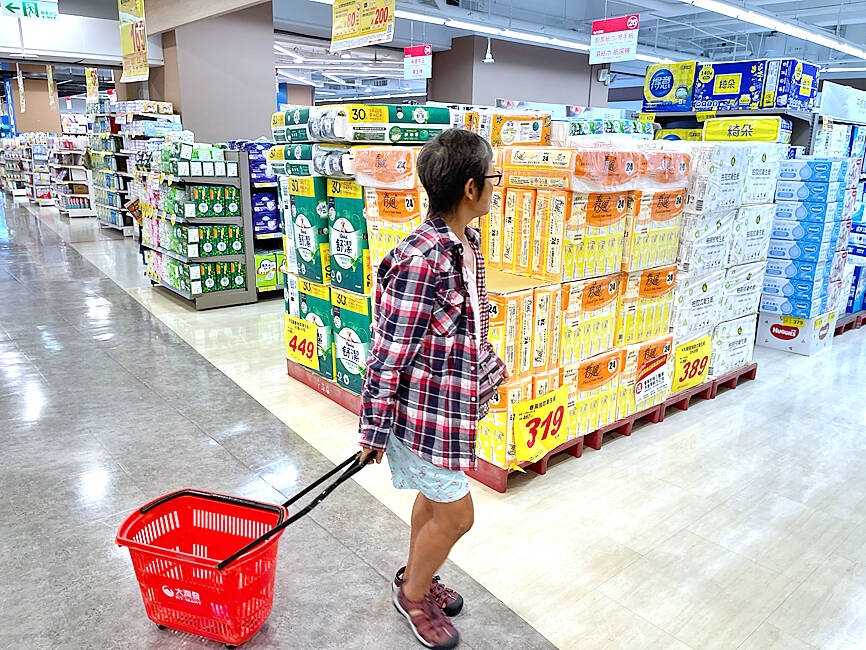The consumer price index (CPI) last month climbed 3.05 percent, the fastest growth in nine months, as bad weather drove up prices of fruit and vegetables, the Directorate-General of Budget, Accounting and Statistics (DGBAS) said yesterday.
The latest inflation data would obligate the government to increase tax breaks to help ease the financial burden on people in time for tax season next year.
“Successive typhoons have damaged crops, pushing up vegetable and fruit prices,” DGBAS official Tsao Chih-hung (曹志弘) said, adding that the seasonal factor would subside from this month given the slim chance of tropical storms and typhoons in the winter.

Photo: CNA
Food costs, the biggest chunk of the CPI weighting, advanced 5.51 percent after fruit and vegetable prices picked up 14.55 percent and 12.32 percent respectively, the statistics agency’s monthly report showed.
Education and entertainment prices rose 3.08 percent as recreational facilities hiked charges by 6.01 percent to take advantage of growing leisure demand in the post-COVID-19 pandemic era, it said.
Medicine and healthcare costs increased 2.6 percent as hospitals and clinics raised drug and copayment rates to reflect higher costs, it said.
The CPI reading after seasonal adjustments rose 0.33 percent, while core CPI, which excludes volatile items, went up 2.49 percent, little changed from 2.48 percent in September, the DGBAS said.
The two measures showed that inflationary pressure has stabilized, although it tends to be sticky, Tsao said.
International oil prices now pose the largest threat, but they have not grown out of control in the wake of the Israel-Hamas war, he said.
The producer price index (PPI), which measures price changes from a seller’s perspective, fell 0.34 percent, mainly because CPC Corp, Taiwan (台灣中油) cut gas prices for industrial users, while prices for metal and chemicals remained weak amid soft demand, the agency said.
In the first 10 months of this year, CPI increased 2.43 percent year-on-year, while PPI shrank 0.54 percent from a year earlier, it said.
Cumulative price increases have reached 5.5 percent since November 2021, steeper than the 3 percent statutory requirement that obligates the government to raise basic living expenses and increase tax deductions on personal income.
Tax exemptions might rise to NT$97,000 from NT$92,000 on personal income tax, while standard deductions and special deductions might gain NT$7,000 and NT$1,100 to NT$131,000 and NT$218,000 respectively, accounting firms said earlier.
The Ministry of Finance is due to release its conclusions on the matter later this month.

‘DANGEROUS GAME’: Legislative Yuan budget cuts have already become a point of discussion for Democrats and Republicans in Washington, Elbridge Colby said Taiwan’s fall to China “would be a disaster for American interests” and Taipei must raise defense spending to deter Beijing, US President Donald Trump’s pick to lead Pentagon policy, Elbridge Colby, said on Tuesday during his US Senate confirmation hearing. The nominee for US undersecretary of defense for policy told the Armed Services Committee that Washington needs to motivate Taiwan to avoid a conflict with China and that he is “profoundly disturbed” about its perceived reluctance to raise defense spending closer to 10 percent of GDP. Colby, a China hawk who also served in the Pentagon in Trump’s first team,

SEPARATE: The MAC rebutted Beijing’s claim that Taiwan is China’s province, asserting that UN Resolution 2758 neither mentions Taiwan nor grants the PRC authority over it The “status quo” of democratic Taiwan and autocratic China not belonging to each other has long been recognized by the international community, the Mainland Affairs Council (MAC) said yesterday in its rebuttal of Beijing’s claim that Taiwan can only be represented in the UN as “Taiwan, Province of China.” Chinese Minister of Foreign Affairs Wang Yi (王毅) yesterday at a news conference of the third session at the 14th National People’s Congress said that Taiwan can only be referred to as “Taiwan, Province of China” at the UN. Taiwan is an inseparable part of Chinese territory, which is not only history but

CROSSED A LINE: While entertainers working in China have made pro-China statements before, this time it seriously affected the nation’s security and interests, a source said The Mainland Affairs Council (MAC) late on Saturday night condemned the comments of Taiwanese entertainers who reposted Chinese statements denigrating Taiwan’s sovereignty. The nation’s cross-strait affairs authority issued the statement after several Taiwanese entertainers, including Patty Hou (侯佩岑), Ouyang Nana (歐陽娜娜) and Michelle Chen (陳妍希), on Friday and Saturday shared on their respective Sina Weibo (微博) accounts a post by state broadcaster China Central Television. The post showed an image of a map of Taiwan along with the five stars of the Chinese flag, and the message: “Taiwan is never a country. It never was and never will be.” The post followed remarks

INVESTMENT WATCH: The US activity would not affect the firm’s investment in Taiwan, where 11 production lines would likely be completed this year, C.C. Wei said Investments by Taiwan Semiconductor Manufacturing Co (TSMC, 台積電) in the US should not be a cause for concern, but rather seen as the moment that the company and Taiwan stepped into the global spotlight, President William Lai (賴清德) told a news conference at the Presidential Office in Taipei yesterday alongside TSMC chairman and chief executive officer C.C. Wei (魏哲家). Wei and US President Donald Trump in Washington on Monday announced plans to invest US$100 billion in the US to build three advanced foundries, two packaging plants, and a research and development center, after Trump threatened to slap tariffs on chips made